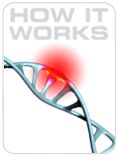胃癌qBiomarker体细胞突变PCR芯片 Gastric Cancer qBiomarker Mutation PCR Array

胃癌qBiomarker体细胞突变PCR芯片 Gastric Cancer qBiomarker Mutation PCR Array
胃癌qBiomarker体细胞突变PCR芯片 Gastric Cancer qBiomarker Mutation PCR Array
运费 ¥0.00
“英拜为您实验加速” 技术服务网址:http://www.yingbio.com/ 服务热线:400-696-6643、 18019265738 邮箱:daihp@yingbio.com 、 huizhang1228@foxmail.com Gastric Cancer qBiomarker Mutation PCR Array 胃癌qBiomarker体细胞突变PCR芯片
胃癌qBiomarker体细胞突变PCR芯片是一个翻译研究工具,用于快速、准确、全面剖析人胃癌样本中发生体细胞突的癌症样本的基因:APC, BRAF, CDH1, CDKN2A, CTNNB1, ERBB2, FBXW7, HRAS, KRAS, NRAS, PDGFRA, PIK3CA and P53.这些突变保证广泛的研究,以提高致癌作用的理解和鉴定潜在的药物靶点。已有许多研究通过单个和多个体细胞突变状态信息鉴定关键信号转导中断。例如,EGFR和KRAS基因的突变状态可以预测某些药物针对这些分子的生理反应。人类胃癌症qBiomarker体细胞突变PCR芯片以其全面的内容覆盖范围,用于研究胃癌的环境突变且有潜力用于发现胃癌和这些突变已确定的其他癌症的靶向药物的靶标。这个芯片包含81个DNA突变序列用于检测最频繁的,功能性验证,在人类人类胃癌有生物学意义的突变。这些突变的选择根据全面的体细胞突变数据库和同行评审的科学文献,来自2000多个胃癌样本表现最频繁重复编译的体细胞突变。产品的简单格式和操作程序允许在任何常规的体细胞突变分析研究实验室提供实时PCR仪器。简单的产品模式和操作程序让任何一个具备实时定量PCR仪的实验室都可进行常规的体细胞突变分析。 APC: 4 Assays The most commonly detected APC inactivation mutations are mainly composed of truncation mutations (due to nonsense mutations and frameshift mutations) and point mutations between codons 1250 and 1578. BRAF: 2 Assays There are two major classes of BRAF mutations. One class leads to increased BRAF kinase activity, such as the p. V600E mutation. The other class leads to impaired kinase activity, such as the p.G469A mutation. CDH1: 1 Assay The top CDH1 mutations either are missense mutations or frameshift mutations that lead to C-terminal truncation and secreted E-cadherin fragments. CDKN2A: 1 Assay The top CDKN2A loss-of-function mutations occur in the consensus ankyrin domain, which leads to inability to form stable complexes with its targets. CTNNB1: 18 Assays The most frequently detected CTNNB1/beta-catenin mutations result in abnormal signaling in the WNT signaling pathway. The mutated codons are mainly several serine/threonine residues targeted for phosphorylation by GSK-3beta. ERBB2: 2 Assays The most frequently identified ERBB2 activating mutations cluster in the ERBB2 kinase domain region. FBXW7: 1 Assay Typically detected mutations lay in either the third or fourth repeat of the protein's WD40 domain, typically involved in protein-protein interactions. HRAS: 1 Assay The most important HRAS mutation in gastric cancer occurs at codon 12. KRAS: 10 Assays The mutation assays include the most frequently occurring mutations in KRAS codons 12, 13, and 61. Mutations at these positions result in reduced intrinsic GTPase activity and/or cause KRAS to become unresponsive to RasGAP. NRAS: 1 Assay The most important NRAS mutation in gastric cancer occurs at codon 13. PDGFRA: 1 Assay The most frequently identified PDGFRA gain-of-function mutations include deletion, point mutation, and deletion-insertion mutations in regions p.D842-S847 and p.R554-E571 as well as the point mutations p.N659Y and p.T674I. PIK3CA: 4 Assays The most frequently occurring PIK3CA mutations mainly belong to two classes: gain-of-function kinase domain activating mutations and helical domain mutations that mimic activation by growth factors. TP53: 35 Assays The most frequently detected somatic mutations in TP53 are largely composed of DNA-binding domain mutations which disrupt either DNA binding or protein structure. Overview of the qBiomarker Somatic Mutation PCR Array / Assay Protocol
Overview of the qBiomarker Somatic Mutation PCR Array / Assay Protocol. Principle of Mutant Discrimination with ARMS®  |









